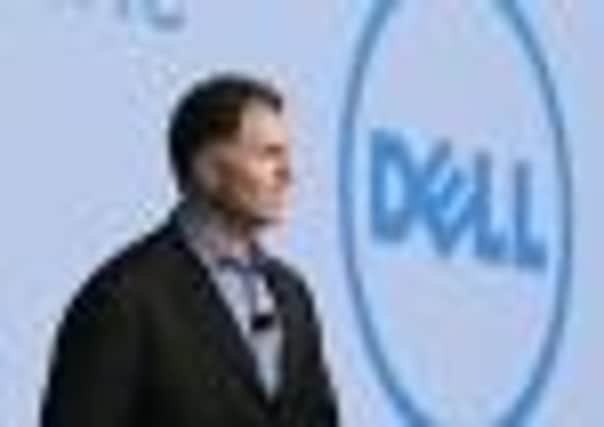Combatants face long haul in Dell battle


The titanic three-way tussle for Dell is shaping up into a showdown involving billionaires, private equity giants and many of Wall Street’s most powerful mergers and acquisitions advisers.
Everybody wants a piece of the action, including some big Dell shareholders such as Southeastern Asset Management, which claims billionaire chief executive Michael Dell is trying to get control of their company on the cheap.
Advertisement
Hide AdAdvertisement
Hide AdSome shareholders want to remain invested in Dell’s equity after any deal is complete, a complication that does not fit with Michael Dell’s vision for a new privately owned future.
Dell’s board has already agreed to a $24.4 billion (£16bn) offer from the founder and private equity firm Silver Lake to buy out Dell’s public shareholders for $13.65 a share and take the company private with the help of a $2bn loan from Microsoft.
But two other proposals from billionaire Stephen Schwarzman’s private equity giant Blackstone and another billionaire, Carl Icahn – a big Dell shareholder – may offer shareholders more if they were turned into real, definitive offers.
There is also the chance that the rival bidders could end up working with each other to find a solution. The negotiations could go on for months. Michael Dell said he is willing “to explore in good faith the possibility of working with third parties regarding alternative acquisition proposals”.
Both the Blackstone and Icahn proposals, if firmed up, plan to give shareholders the chance to cash out at a slightly higher level than Michael Dell’s offer but would also leave a “stub” of the company in the public market for those stockholders who wish to share in Dell’s fortunes.
The demand from some investors for a “stub” of the company to remain in public hands has been a surprising feature of this corporate fight.
Blackstone says its proposal would offer shareholders “greater than $14.25” per share if they want to cash out, while Icahn’s much more complicated plan says it would offer $15 cash per share for up to 58 per cent of Dell stock.
One of Icahn’s many suggestions is for Dell to pay out a huge special dividend to shareholders. Icahn is a past master of extracting value from companies.
Advertisement
Hide AdAdvertisement
Hide AdSoutheastern Asset Management, in a powerful position because it owns about 8.5 percent of Dell’s stock, says Dell shares are worth almost $24 each and that it will not vote in favour of the deal with Michael Dell and Silver Lake as it is currently structured.
Michael Dell’s $13.65 offer represents a 25 per cent premium to Dell’s $10.88 share price the day before rumours of a possible deal leaked into the news media, but many shareholders still feel it is too cheap.
“We are writing to express our extreme disappointment regarding the proposed go- private transaction, which we believe grossly undervalues the company,” said Southeastern’s chief executive Mason Hawkins in his letter to the Dell board.
“We would have endorsed a transformative transaction that would have provided full and fair value to Dell’s public shareholders, including a leveraged recapitalisation or a go-private type sale where current shareholders could elect to continue in a new company with a public stub.
“Unfortunately, the proposed Silver Lake transaction falls significantly short of that, and instead appears to be an effort to acquire Dell at a substantial discount to intrinsic value at the expense of public shareholders.”
At first glance, Dell, languishing in third place in the PC market behind Lenovo and Hewlett-Packard, would appear to be an unlikely target for such a frenzied buy-out battle. Further, a proxy statement due to be released any day now is expected to reveal in harsh detail the problems being faced by Dell in its core businesses. It is seen as a troubled PC maker in a world increasingly in love with tablets and mobile technology. However, Dell has up to $14 billion of cash and Michael Dell, at least, believes the company can have a strong future – but it has to be away from the short-term scrutiny of the public markets.
He appears to believe that his vision for the company he formed in his college dorm is not understood by the public and its markets and that private status is required to buy the time to turn the company around.
“I believe this transaction will open an exciting new chapter for Dell,” said the chief executive. “We can deliver immediate value to stockholders, while we continue the execution of our long-term strategy … as a private enterprise.
Advertisement
Hide AdAdvertisement
Hide Ad“We recognise that it will still take more time, investment and patience, and I believe our efforts will be better supported by partnering with Silver Lake.”
Blackstone’s proposal is much more straightforward than Icahn’s, especially if it could reach an agreement with Michael Dell – who still owns roughly 15 per cent of Dell’s shares – to remain as chief executive if it won control of the company.
News reports claim Michael Dell has already spoken to Blackstone executives.
“We believe there is significant upside in the Dell businesses, we see significant upside in the value of Dell’s shares …” said Blackstone in its proposal to the Dell board.
And crucially, Blackstone added: “We have held discussions with some of Dell’s largest shareholders, and we anticipate inviting them, certain of Dell’s other shareholders and certain other strategic and financial partners to participate in the transaction as part of our group.”
In the case of RJR Nabisco in Barbarians At The Gate, the chief executive who tried to buy out his shareholders finally lost out to the outside bidders and the book became a great movie.
It is too early to say whether this time around the battle will be as nasty or whether a more modern, touchy-feely solution can be found.
That would not make for as good a book.